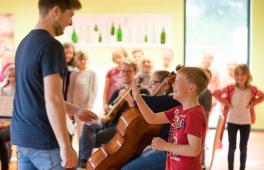The amount of music lessons to be taught in primary schools is determined in the Stundentafeln (time tables) of the federal states. According to information from the Ministries of Education and Cultural Affairs of the Länder, in 2018 music was taught as a regular school subject with one to two hours per week per grade level in Berlin, Lower Saxony, Saxony, Saxony-Anhalt and Thuringia, whereby Thuringia provided the amount with a minimum specification. In the other states, music was indirectly a component of larger learning areas or combined subjects. Here, as a rule, a pool of lessons or a quota of lessons is specified. The internal distribution or the proportion of the individual quota can be largely determined and set by the schools themselves according to local circumstances. One exception was Lower Saxony, where music could also be taught as an alternative to the regular school subject in the network, but a concrete specification was made on the proportion of the subject in the quota number of hours.

Note
Shown are the Stundentafeln for music in primary schools in 2018. The table shows target values in hours per week (school units) for the lessons to be taught class level for each federal state. They are therefore not the actual values of the lessons taught in primary school. The primary school period in Berlin and Brandenburg is 6 years.
Footnotes
- The teacher does not assign special instruction subdivided by hours.
- The lesson allotment plan assigns a total number of hours in the relevant subjects for grades 1 and 2. The lesson hours are distributed among the subjects on the basis of the individual learning achievements in the class.
- Only 1 hour as of the 2019-20 school year.
Source information
Compiled by Ortwin Nimczik using information from the State Ministries of Education and Cultural Affairs (KMK).



